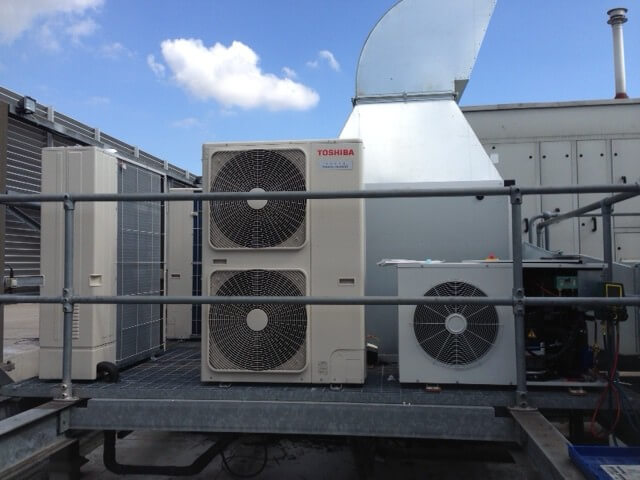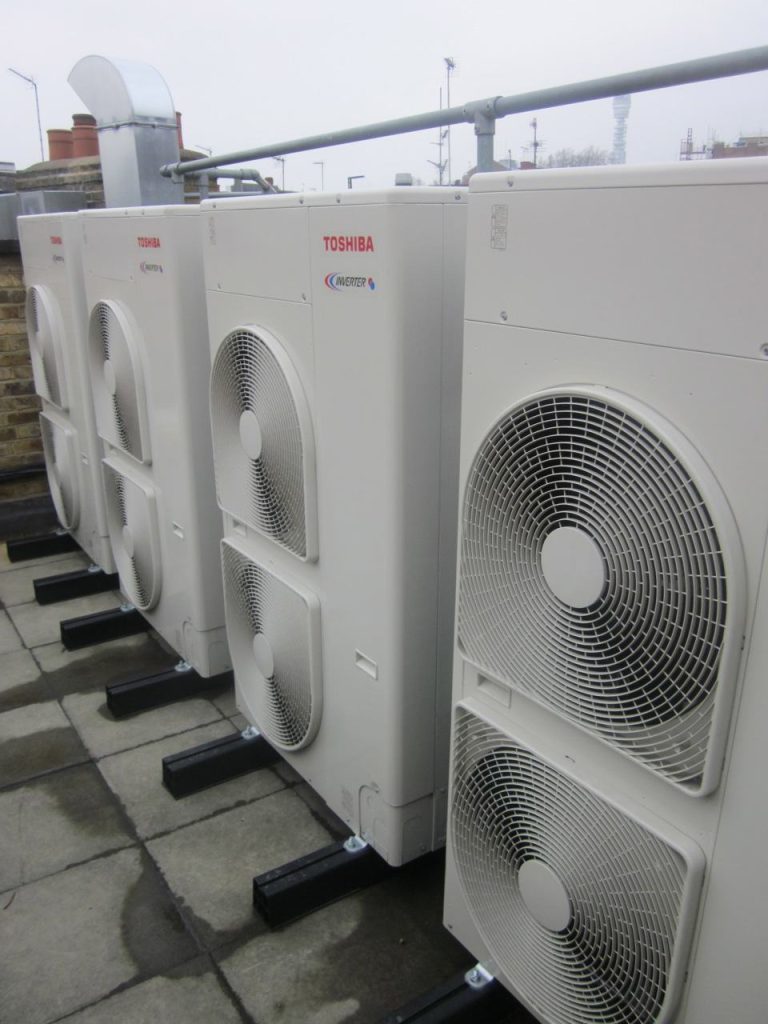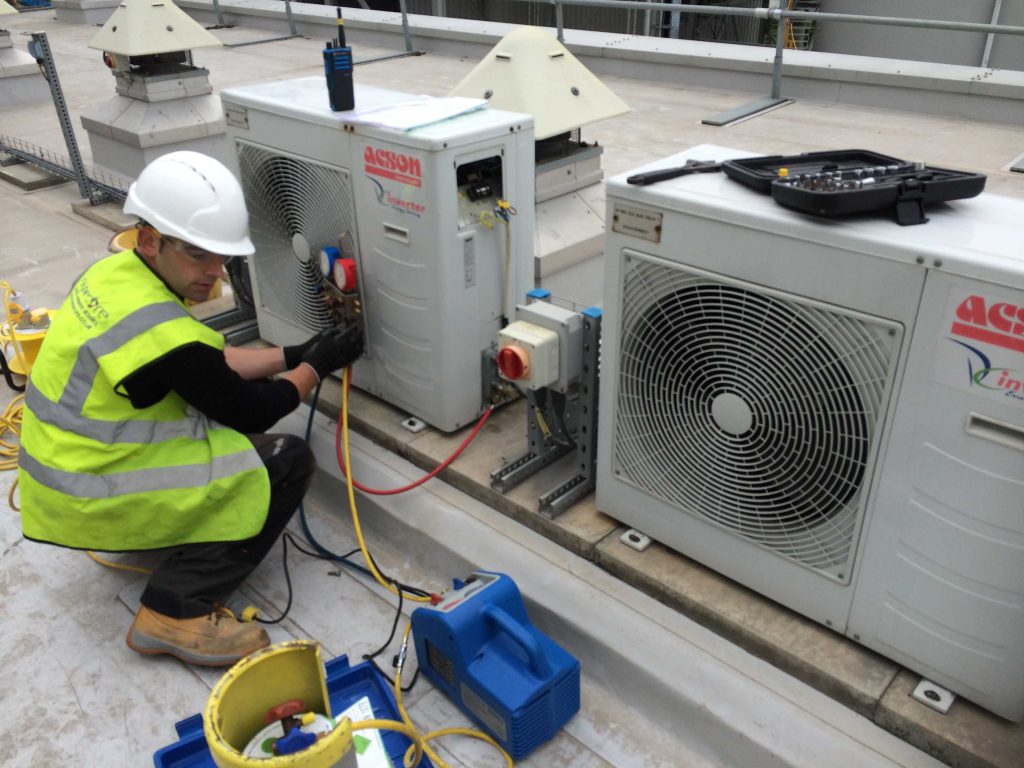UK Heatwaves Will Make Air Conditioning A Growing Necessity

Estimated reading time 11 minutes
We all know about climate change and can see that it is having an impact on our environment as the planet is warming, rainfall patterns change, and sea levels rise. As a consequence of climate change the average global temperature has risen by over 1°C since reliable data was first recorded in the 1850-1880s. The Intergovernmental Panel on Climate Change (IPCC) Sixth Assessment Report states that global surface temperatures have increased faster since 1970 than any other 50-year period over at least the last 2000 years. It is also virtually certain that there have been increases in intensity and duration of heatwaves.
The top 10 hottest years in the UK's have all occurred since 2002. As the planet warms heatwaves become more likely along with droughts, floods and fires. According to the Met Office on-going climate change will result in future changes to UK climate and weather events including changes in intensity and frequency of UK “warmer and wetter winters. Hotter and drier summers and more frequent and intense weather extremes.”
The UK has already experienced a number of heatwaves with the Met Office issuing heat-health alerts. The Met Office defines a heatwave as “an extended period of hot weather relative to the expected conditions of the area at that time of year, which may be accompanied by high humidity.” They go onto say that “a UK heatwave threshold is met when a location records a period of at least three consecutive days with daily maximum temperatures meeting or exceeding the heatwave temperature threshold.”
History Of UK Heatwaves
In July 2024 a Yellow Heat Health Alert was issued for parts of England. The highest temperature recorded in 2024 was 34.8C in Cambridge on 12 August. There was also an official heatwave, in some southern locations.
From September 4-10, 2023, the UK experienced a heatwave with daily maximum temperatures exceeding 30°C across south-east England for seven consecutive days. This was the longest run of days in September which exceeded 30°C on record, with the previous longest runs five days in September 1929 and 1911.
During July 16-19, 2022, the UK experienced an unprecedented heatwave with extreme temperatures recorded on both the 18 and 19 July. This heatwave was a milestone in UK weather history with temperatures of 40°C being recorded for the first time in Coningsby, Lincolnshire. Many services were affected including Network rail issuing a ‘do not travel’ warning as tracks buckled and overhead cables sagged, flights were suspended at Luton airport after the heat affected the runway and the NHS suffered from a spike in 999 calls. As a consequence, the Met Office issued its first red warning (a red warning means that there could be adverse health effects for all of the population) for extreme heat since the Extreme Heat National Weather Warning Service was introduced in June 2021. The UK Health Security Agency and Met Office also issued a level 4 alert for the first time since the heatwave plan was introduced for England in 2004, resulting in the government declaring a national emergency.
In August 2020 a heatwave in south-east England reached temperatures of 34°C for six consecutive days and also resulted in several ‘tropical nights’ with overnight temperatures remaining above 20°C. The highest daily minimum temperatures were in London.
A record-breaking heatwave was recorded in July 2019. The temperatures across eastern England reached 35 to 36°C, a temperature of 38.7°C on the 25 July in Cambridge University Botanic Garden and 38.5°C in Faversham, Kent on 10 August 2003. A further 10 areas across the south-east, Midlands and East Anglia exceeded 37°C. Just as in 2022 the rail network was affected across south-east England with train cancellations and main lines closed out of London due to concerns with rail buckling and trackside vegetation caught fire in several locations.
In July 2006 the Met Office recorded record breaking heat and sunshine with temperatures of 30-32°C in southern England and the Midlands placing strain on water and energy utilities, road and rail transport and the health and fire services.
In August 2003 Brogdale, near Faversham reported the highest temperature of 38.5°C.
At the beginning of August 1990 a temperature of 37.1°C was measured at Cheltenham beating the previous record of 36.7°C set which was in Northamptonshire, Surrey and Kent on 9 August 1911. Temperatures exceeded 32°C across large areas of southern, central and eastern England and east Wales from the 1 to 4 August, peaking on the 3 August with large swathes of England recording temperatures over 35°C. Roads were closed as surfaces melted, restrictions were in force for some inter-city trains in case rails buckled and Heathrow airport suffered runway issues.
Will The UK’s Climate Continue To Change?
The State of the UK Climate 2020 article published in The Royal Meteorological Society’s International Journal of Climatology executive summary states that 2020 was the first year that the annual values for rainfall, temperature and sunshine were all in the top ten in the same year. 2020 was third warmest, fifth wettest and eighth sunniest on record for the UK.
Mike Kendon, lead author and Senior Climate Scientist at the Met Office said: “2020 was another notable year for the UK climate, with records broken for daily rainfall and monthly sunshine hours. Average temperatures for the UK continue to climb, with nearly a degree of warming when comparing the most recent 30 years with the preceding 30-year period. Last year saw some significant weather extremes including severe flooding from heavy rainfall in February and a major heatwave in early August.”
Significantly all of the top ten warmest years for the UK in records dated back to 1884 have occurred since 2002, and in the case of central England, the 21st century has so far has been warmer than the previous three centuries.
The State of the UK Climate 2020 article goes onto say that the last 30-year period from 1991-2020 has been 0.9°C warmer than the preceding 30 years from 1961-1990 and the most recent decade from 2011–2020 has been on average 0.5°C warmer than the 1981–2010 average and 1.1°C warmer than 1961–1990 clearly showing a warming trend across all months and all countries in the UK. Heatwaves, like that of summer 2018, are now 30 times more likely to occur in the UK due to climate change and by 2050, heatwaves are expected to happen every other year.
It’s clear that the trend with regards to temperature is upwards in fact the Met office predicts thatby 2070 winter will be between 1 and 4.5°C warmer and up to 30% wetter and summer will be between 1 and 6°C warmer and up to 60% drier.
An Imperial College London article “Climate change made UK heatwave more intense and at least 10 times more likely” highlights a study which found that human-caused climate change will increase the likelihood and severity of heatwaves in the UK faster and ten times more likely than predicted.
The UK Government’s research briefing “Public health impacts of heat” recognises the change in UK climate is leading to an “increase in frequency, duration and magnitude of extreme heat events, including heatwaves. [Five heat periods of extreme heat were recorded in England in 2022, and temperatures exceeded 40°C for the first time]. UK climate observations show a rise in annual mean and peak temperatures, with maximum temperatures rising at a faster pace than mean temperatures.” The report goes onto say that “Heat and heatwaves pose a threat to public health. In summer 2022, an estimated 2,985 deaths were associated with the five heat periods in England. Without further adaptation to heat, this number is projected to increase further.”
You can “explore what climate change will look like near you” via a Met Office tool, built in collaboration with the BBC.
Effect Of Heatwaves on Humans
The human body isn’t designed for extremes in temperature and heatwaves can have a direct effect on health as they compromise the body’s ability to regulate its temperature. This loss of temperature control coupled with fluid and salt loss through sweating puts more strain on the hearts and lungs and can result in heatstroke which includes confusion, seizures and loss of consciousness; heat exhaustion which can involve dehydration, muscle cramping, headaches, exhaustion, fatigue, fainting, dizziness and nausea and hyperthermia (abnormally high body temperature) and cause health conditions such as respiratory disease, heart disease, cerebrovascular disease (affecting the blood vessels in the brain and cerebral circulation), and diabetes to worsen.
A number of research papers and reports have outlined the detrimental effect of UK heatwaves.
The “2023 Health Effects of Climate Change (HECC)” report states that “heat causes physical health issues including heatstroke and cardiovascular issues. Poor physical health can worsen mental health conditions like anxiety and PTSD, and those with existing mental health issues can be particularly prone to the impacts of heat.”
“Feeling the heat: a British Red Cross briefing on heatwaves in the UK” published by the Red Cross looked at existing literature, expert interviews, and the results of a new survey of 2,000 UK adults. It explains that “Heatwaves can cause heatstroke and exhaustion, and exacerbate underlying health conditions, such as kidney disease and heart disease. They place significant strain on the health and social care system and cause chaos for our infrastructure and businesses through cuts to water supplies, damaged rail networks and depleted workforces. If we don’t act now, the problem will only get worse. Projections show that hotter summers aren’t going away – by 2050, heatwaves are projected to double in frequency and become more intense, resulting in three times more excess deaths caused by hot weather annually.”
According to the Lancet Countdown “The extreme heat in the UK and across Europe is threatening peoples’ health. Heat vulnerability in the UK has been steadily rising, with an ageing population and increase in underlying health conditions, and without adequate measures to adapt heat-related deaths are expected to rise to around 7,000 each year by the 2050s. Last summer, there were more than 1,600 excess deaths recorded during heatwave conditions in the UK, with 90 per cent of excess deaths observed in over 65-year-olds. Climate experts have consistently warned of increasing risk to life with a higher frequency of extreme heat events as the planet continues to warm.”
Executive Director of the Lancet Countdown Dr Marina Romanello explains: “The temperatures in England [have been] exceptional, posing a life-threating risk for many people in the UK. These rising temperatures show how climate change has become an existential threat. We cannot let extreme heat become the norm. Efforts to mitigate the changing climate must accelerate to protect health and prevent temperatures from rising beyond the bounds of a liveable future.”
The BBC have reported that advisors on climate change believe “Heat-related deaths will triple over coming decades without government action on overheating in our homes”. This is backed by the Climate Change Committee on their “Risks to health, wellbeing and productivity from overheating in buildings” page where one of their key conclusions states “increasingly hot summers could lead to a trebling of health and productivity impacts without additional adaptation.”
Air Conditioning A Growing Necessity
It's clear that UK temperatures are going to continue to rise and as such the need to be able to control indoor tempertaure is becoming a necessity.
Air conditioning can provide the solution to controlling indoor temperature, keeping the inside warm when its cold outside and cool when its warm outside; it also controls the indoor humidity and purifies the air ensuring a comfortable home and work environment no matter the outside temperature. Technical innovation also means that air conditioning is an efficient and eco solution to heating and cooling your home and workplace.
Expert Air Conditioning and Support
Syncore is an expert in air conditioning installation and can install air conditioning throughout London and the wider UK. Synecore is an approved supplier and installation expert for air conditioning brands, Mitsubishi Electric, Toshiba and Daikin. These brands are the disruptors in developing clean and efficient cooling and heating solutions for commercial and residential properties.
Synecore also offers air conditioning Planned Preventative Maintenance (PPM) to ensure your air conditioning system is running as efficiently as possible throughout the year. Our customers receive high priority status for any air conditioning breakdowns and repairs, with an engineer onsite within hours of the fault being reported.
If you are looking to install a new air conditioning installation or need to replace an old system, contact our team or call on 01795 509 509. We’ll talk you through your options and provide you with expert advice on the right heating, ventilation and air conditioning system for you.



